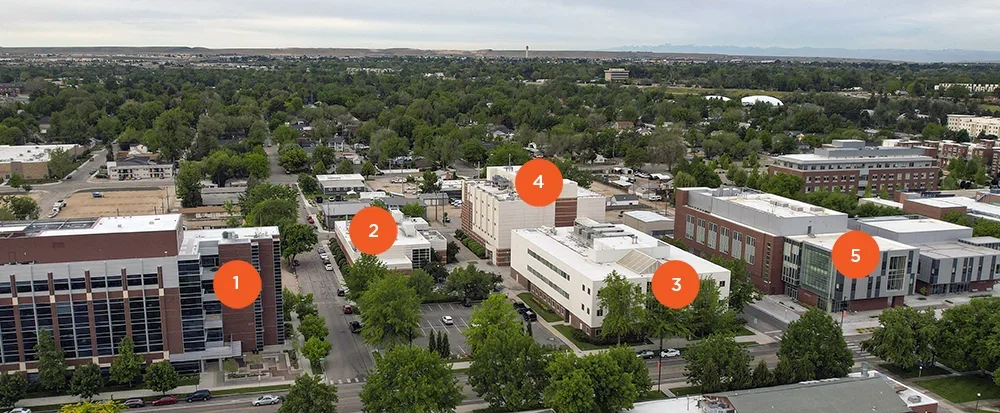Core Facilities

Core facilities support a range of services, including research. Locations: (1) the Environmental Research Building (ERB), (2) Harry Morrison Civil Engineering (HML), (3) Charles P. Ruch Engineering (RUCH), (4) Micron Engineering Center (MEC), and (5) Micron Center for Materials Research (MCMR). We also use the Yanke Family Research Park (YFRB) along the Boise River, the campus Multipurpose Classroom building (MPCB), and City Center Plaza (CCP) and the U.S. Bank Building, both in downtown Boise. Directions: Search by building code or name at the Campus Map.
FaCT Core Research Facility
The College of Engineering houses a core research facility called the Fabrication, Characterization, and Testing (FaCT) core. It is also a central component of the Convergent Engineering and Biomolecular Science Center of Biomedical Research Excellence (CEBS COBRE). It contains four distinct service groups. For detailed information regarding capabilities, services, and rates, click the drop down and explore the following links.
Biomechanics and Mechanobiology (BMMB)
The BMMB provides a variety of equipment to support cell biology and mechanotransduction experiments. Our services include: biosafety cabinets and incubators for mammalian cell culture growth, fluorescent and live cell imaging by confocal microscopy, micro-computed tomography, and bioreactors for cell strain and simulated microgravity experiments.
Boise Center for Materials Characterization (BSCMC)
The BSCMC provides access for campus and community members to equipment and expertise in Electron Microscopy, Atomic Force Microscopy, and X-Ray Analysis as a campus recharge center. This includes our X-Ray and Electron Microscopy Lab (XEML) and Surface Science Lab (SSL).
Idaho Microfabrication Lab (IML)
The IML is a user facility dedicated to the education and advancement of fabrication technologies used in the areas of nano/microfabrication and additive manufacturing accessible to both campus and industry partners looking to fulfill their needs for crafting intricate microchips, sensors, and MEMS devices.
Research Machining and Engineering (RME)
The RME provides expertise in engineering design, fabrication, and repair services for research. The team specializes in mechanical design, electrical and mechanical repair, current design feedback, and fabrication.
Centers
The college provides oversight in whole or in part over three centers, with the first particularly responsive to supporting regional educational institutions and businesses.
Details follow for the:
- CEBS COBRE
Grows regional biomolecular research capacity - Center for Advanced Energy Studies at Boise State University
Advances regional energy innovation and policy; advanced manufacturing; and cybersecurity, computing and data visualization - Center for Atomically Thin Multifunctional Coatings
Develops novel coatings and functionalities enabled by two-dimensional materials
Also See: You might also want to explore the university-run Institute for Microelectronics Education and Research. It partners with industry to advance regional capacity for semiconductor and microelectronics development.
CEBS COBRE
The Convergent Engineering and Biomolecular Science Center of Biomedical Research Excellence advances regional biomedical research and clinical applications that use biomedical devices, sensors, and systems. The National Institutes of Health funds this university center, with a director / principal investigator (PI) from the College of Engineering, and an associate director / co-PI from the College of Arts and Sciences.
Its Fabrication, Characterization, and Testing (FaCT) core research facility has four parts: (1) Biomechanics & Mechanobiology, (2) the Boise State Center for Materials Characterization, (3) the Idaho Microfabrication Lab, and (4) Research Machining & Engineering.
Contact: Jim Brownin
Center for Advanced Energy Studies at Boise State University
Boise State collaborates as part of a multi-institutional research-education partnership with funding from the Department of Energy. Together, three Idaho universities, private industry, and the Idaho National Laboratory address energy innovation and policy; the energy-water nexus; advanced manufacturing; cybersecurity; and computing and data visualization.
Boise State Headquarters: ERB
Contact: David Estrada
Center for Atomically Thin Multifunctional Coatings
This national university, industry, and government partnership expands industry innovation by creating novel coatings from two-dimensional materials, with unique physical, optical, electrical and chemical properties. National Science Foundation and industry funding advance energy, healthcare, accessibility, space exploration, and environmental solutions.
Penn State University leads. Boise State contributes expertise in additive manufacturing of electronics, atomic layer deposition, and scanning probe microscopy.
Boise State Contact: David Estrada
The College of Engineering at Boise State University provides core facilities and service centers to faculty, students, and regional partners that are pivotal to world-class research. We invite potential external collaborators to contact our centers about opportunities to collaborate with our investigators, or to use research facility and equipment services.